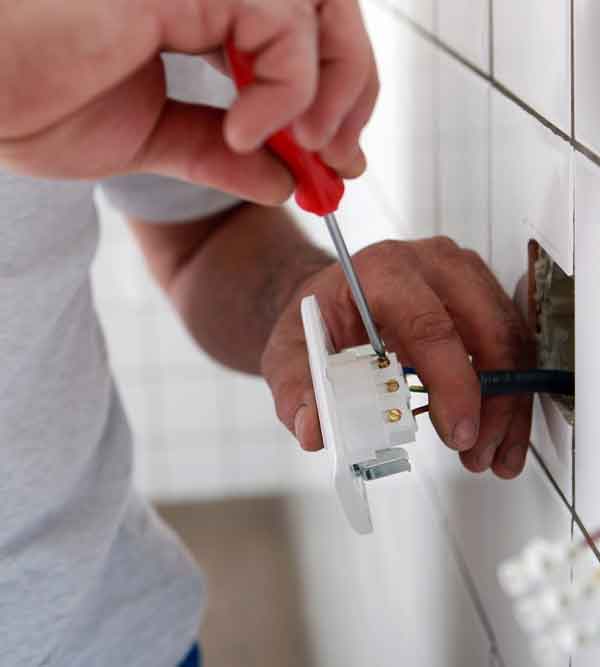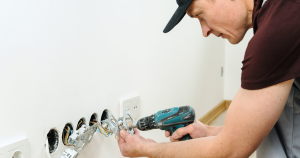Electrical systems can be complicated and confusing if you don’t have professional training.
That’s why we created this quick electrical troubleshooting guide to give you pointers for the most common issues you may experience in your home or business.
This simple guide will help you decide if you need more advanced help from a professional electrician. Read on!
How can you troubleshoot an electrical short circuit at your home?
Electrical circuits at home usually face a number of common issues such as connecting too many electrical appliances to a single circuit.
Other problems can be switches, cords or outlets that are defective or defective circuit systems within an appliance itself.
What is a short circuit?
Generally, a short circuit occurs when a “hot” wire (The wire that carries the live electrical current) comes in contact with a neutral wire. This can happen very quickly and can result in sparks or flames where the two wires connect.
Wires that are not insulated properly or have been worn down over time can allow these two wires to make contact creating a short circuit, or short path for electricity to travel down.
Short circuits can occur in wiring and in individual appliances/receptacles as well.
A ground fault is a similar situation when the “hot” wire comes in contact with any part of the electrical system that is grounded. This could be the ground wire or a metal box that is grounded.
This allows electricity to instantly travel towards the ground/earth with the same results of sparks and sometimes flame.
In either case, if your home is equipped with circuit breakers they should be designed to trip when this contact occurs as too much power begins to flow through the circuit all at once.
Be cautious when turning a circuit back on that has been tripped. This is a critical safety feature designed to prevent fires and damage to your appliances.
Overloaded circuits are another culprit
When your home or business was wired an electrical contractor designed each circuit to provide power to receptacles and switches for your various appliances and other electrical needs.
Each circuit has a limit of how much power can be supplied to it before the circuit breaker (or fuse in older homes/buildings) trips cutting off power to everything in that circuit.
A common cause of trouble can be circuits that are overloaded by having too many appliances, devices, or other electronic items plugged in at once.
Overloaded circuits may not trip a circuit breaker but might result in flickering lights, buzzing outlets or switches, a burning smell or appliances that do not seem to work at full power.
Although the breaker may not trip immediately these conditions can lead to a short circuit if not dealt with due to the heat that builds up in the wires and connections.
Use the following steps to easily troubleshoot these common problems in your home:
- If the power has gone out in a certain area of your home or business, begin by turning off electrical appliances and light switches in that circuit to reduce the amount of power that flows through the circuit. Then:
- Find the circuit breaker box and the breaker that has been tripped.
- Turn the breaker all the way off and then back on again – wait a little bit to see if it trips right away.
- If you experience resistance turning the breaker back on, STOP and call a qualified electrician. Remember circuit breakers are designed to protect from fire and damaged appliances.
- If you smell burning, have flickering lights or any other signs that a circuit is overloaded do the same thing by turning off appliances one by one. You may discover the cause is a faulty appliance or simple overloaded circuit.
- If the flickering or other signs stop as you reduce the number of appliances plugged in a certain area, you may need to have an electrician install another circuit with more receptacles for your needs.
- Resist the urge to use extension cords from other circuits as they are designed for temporary use and create another fire hazard.
NOTE: If the burning smell increases or you see smoke immediately call 911 and have the fire department ensure there is no danger to you or your family. Do not ignore these signs of danger. Then call a licensed electrician to be sure issues are fixed correctly.
- Check if it is simply one faulty outlet by plugging in something you will be able to tell works like something with indicator lights.
- If you discover that you have a fuse box and a fuse has blown we suggest calling an electrical contractor like Assurance Electrical Services. Older systems that show signs like these often need more attention to prevent fires and further damage.
Call a Professional for a Detailed Electrical Troubleshooting Guide Today!
When in doubt, call everyone’s hometown electrician to identify and repair any issues you are unsure of. The wiring of your house should be left to the professionals for your safety.
Jeff Brandlin is the founder of Assurance Electrical Services, LLC. He started in the electrical industry when he was 21 and had worked in several electrical firms before founding Assurance Electrical. Jeff is dedicated to providing the best quality service to his clients and always puts their needs first. Outside work, Jeff enjoys spending time with his wife and children.





